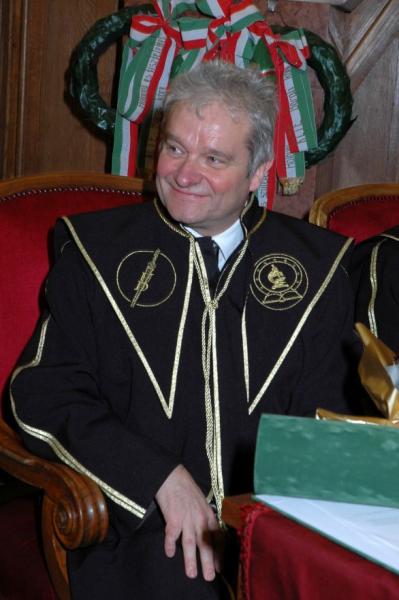Sir Paul M. Nurse, a Rockefeller Egyetem (USA) professzorának díszdoktori avatása a Debreceni Egyetemen 2005. november 26.
 Paul Nurse was born and raised in Wembley, in North West London. He received his undergraduate degree in 1970 from the University of Birmingham and his PhD in 1973 from the University of East Anglia. During the years 1976-80, Nurse identified the key regulator of the cell cycle, the gene cdc2 in fission yeast. Three years later, he identified the counterpart of the gene cdc2 in human, later called CDK1. In 1988, Paul Nurse was invited to chair the department of microbiology at the University of Oxford, where he continued working on the regulation of cell cycle. He left in 1988 to accept the position of Director of Research of Imperial Cancer Research Fund (ICRF). In 1996, he was named Director General of the ICRF. He was knighted in 1999. In 2003, he became president of Rockefeller University in New York City where he continues to work on the cell cycle of fission yeast.
Paul Nurse was born and raised in Wembley, in North West London. He received his undergraduate degree in 1970 from the University of Birmingham and his PhD in 1973 from the University of East Anglia. During the years 1976-80, Nurse identified the key regulator of the cell cycle, the gene cdc2 in fission yeast. Three years later, he identified the counterpart of the gene cdc2 in human, later called CDK1. In 1988, Paul Nurse was invited to chair the department of microbiology at the University of Oxford, where he continued working on the regulation of cell cycle. He left in 1988 to accept the position of Director of Research of Imperial Cancer Research Fund (ICRF). In 1996, he was named Director General of the ICRF. He was knighted in 1999. In 2003, he became president of Rockefeller University in New York City where he continues to work on the cell cycle of fission yeast.
The gene cdc2 and its human homologue CDK1 encode proteins that are members of a family called cyclin dependent kinases. The CDKs bind to cyclins, and the resulting complexes drive the cell through the cell cycle by altering the structure and function of other proteins in the cell. These fundamental discoveries have profoundly increased our understanding of how the cell propagation is controlled. Defects of this system are considered to be one of the reasons behind the transformation of normal cells into cancer cells. Paul Nurse has won a Lasker Award and a Nobel Prize for his role in discovering the key regulators of the cell cycle and been knighted for his services to cell biology and cancer research.